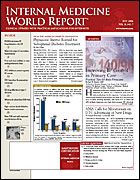Publication
Article
Internal Medicine World Report
ACE Inhibitors May Be Chemoprotective, Reduce GI Cancer Risk
Author(s):
LOS ANGELES—Several retrospective analyses presented at Digestive Disease Week 2006 suggest that angiotensin-converting-enzyme (ACE) inhibitors can reduce the risk of gastrointestinal (GI) cancer, including colorectal, esophageal, and pancreatic cancers. Particularly impressive was the reduction in risk of colorectal cancer among patients with diabetes, who are at increased risk for this type of carcinoma.
This potential benefit of ACE inhibitors may be a result of their ability to suppress tumor angiogenesis by blocking vascular endothelial growth factor, said Vikas Khurana, MD, of the Overton Brooks VA Medical Center, Shreveport, La.
Dr Khurana compared the risks of colorectal, esophageal, and pancreatic cancer among veterans who took ACE inhibitors and those who did not, using the Veterans Integrated Service Network database, a registry established in 1996 that contains data on every veteran who received care from the South Central VA Health Care Network between October 1998 and June 2004.
The study included 483,733 patients, 38.4% of whom used ACE inhibitors before their GI cancer was diagnosed. Among the entire group, 6697 had colorectal cancer, 659 had esophageal cancer, and 475 had pancreatic cancer.
After adjusting for variables such as reflux disease, alcohol consumption, body mass index, age, smoking, nonsteroidal antiinflammatory drug use, and diabetes, use of ACE inhibitors was associated with risk reductions of:
• 53% for colorectal cancer
• 52% for pancreatic cancer
• 46% for esophageal cancer.
“All the findings were independent of statin use,” said Dr Khurana. Statins have been associated with a lower risk of certain cancers, he said.
The results were not stratified by type, dosage, or duration of ACE inhibitor use.
These data were mirrored by a nested case-control analysis that looked solely at colorectal cancer risk and ACE inhibitor use. A database of 339,525 patients with hypertension was used to compare 1988 patients with colorectal cancer and 18,131 matched controls.
Patients with <1 year of ACE inhibitor use before colon cancer diagnosis were excluded from the analysis. Follow-up was 4.5 years.
ACE inhibitor use for >3 years was associated with a 21% reduced risk of colorectal cancer. Those who used ACE inhibitors for at least 5 years had a 45% reduction in cancer risk, said lead investigator George Makar, MD, of the University of Pennsylvania, Philadelphia.
“The association was stronger among diabetics, who have a greater baseline risk of colorectal cancer,” Dr Makar said. In these patients, ≥3 years of ACE inhibitor use cut the risk of colorectal cancer by as much as 73%.
In contrast, angiotensin II may promote colorectal cancer growth by inducing neovascularization and expression of insulinlike growth factor-1 (IGF-1), he said. The antitumor effects of ACE inhibitors may be related to inhibition of the IGF-1 pathway.





